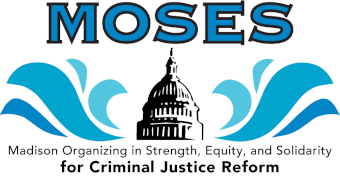
Mothers in Chains….Wisconsin’s Shame
Join the MOSES Religious Leaders Caucus in Supporting WI SB WI SB393
Our focus is on getting this bill reintroduced in the fall 2018 legislative session. Please contact your legislators to request scheduling of Senate Bill 393 in it’s original form on the legislative calendar.
Support WI SB SB393 entitled “The treatment of a pregnant or postpartum person in prison and county jail” introduced by Senator Lena Taylor (D – Milwaukee) , Representative Lisa Subeck (D-Madison) and others in 2017. Sen. Wanggaard (R – Racine) and Rep. Kooyenga (R – Brookfield), are co-sponsoring this bipartisan bill.
We urge you to contact your representatives and request they begin the new session by supporting SB 393.
Advent Season information sheets for Christian church distribution/bulletins
Sample letter to legislators (pdf)
Sample letter to legislators (MSWord)
Legislative Committee Hearing Materials for SB393 on 10/19/2017 
Graphic Images
Woman and Officer poster image
Mary and Officer poster image (Christian)
Mary with halo and Officer poster image (Christian)
Increasing Incarceration Rates for Women
Women’s incarceration has been increasing at a rate higher than 50% than men since the 1980’s. This increase is due to stiffer drug sentencing laws, and post-conviction barriers to reentry which have uniquely affected women. (Sentencing Project) This increase in women’s incarceration has meant that there has also been an increase of children born during imprisonment. Our policies have failed to address the physical, psychological and spiritual needs of this vulnerable population.
Risk to Mothers and Babies
Shackles, in particular, have added an extra emotional burden of shame and are a health risk to both mother and child. Our practices in Wisconsin, have been far from humane. Shackling, which includes the use of belly-chains, during labor, creates health risks for both mother and child is opposed by leading medical groups such as the American Medical Association. This bill provides statutory guidance on when and how correctional officers may
restrain people in labor.
Under this law, a pregnant person in labor may not be restrained unless the restraints are reasonably necessary for the legitimate safety and security needs of the person, correctional staff, or public, and any restraints used must be the least restrictive possible.(Analysis by the Legislative Reference Bureau) Also, this bill eliminates solitary confinement of women who are pregnant, provides prenatal and postnatal education and support, as well as appropriate medical care including mental health services and medication-assisted treatment. Testing for pregnancy followed by the screening of pregnant women for sexually transmitted diseases, including HIV and additional training for personnel are also included.
Read the ACLU Briefing Paper: The Shackling of Pregnant Women and Girls in U.S. Prisons, Jails, and Detention Centers
Read the AMA Brief: An Act to Prevent the Shacking of Pregnant Prisoners Model State Legislation
Provide Humane Care to Mother and Unborn Child
The Religious Leaders Caucus of MOSES believes passing this legislation is an essential step in the direction of providing more humane care and we encourage more research, review and policy change to be implemented in the future to determine best practices on behalf of pregnant and postpartum people who are in the custody of a correctional facility.
Restore Dignity and Create Savings
This bill will restore dignity for pregnant individuals who are incarcerated, improve health outcomes, and save taxpayer dollars by:
- reducing the number of lawsuits and settlements resulting from city or county shackling practices,
- creating savings for Medicaid by reducing the number of costly interventions such as caesarean sections and instrument assisted births, and
- reducing long-run costs to Medicaid and public services from the early detection and treatment of STIs such as HIV, which can be transmitted from mother to child.
It’s Time to Join the States That Have Taken Action
The Federal Bureau of Prisons, as well as over 21 states, have taken steps to develop better care for pregnant and postpartum incarcerated women. It is time for Wisconsin to move Forward.
Background
Milwaukee prison lawsuit: 41 women were shackled while giving birth
International Human Rights Clinic. Shackling of Pregnant Prisoners in the United States
It’s 2017, and Most States Still Allow Shackling of Prisoners During Labor and Delivery (Mother Jones 2017)
ACOG 2017 State Legislation Tally: Incarcerated Women: Limiting the Use of Restraints (2017)
University of Arkansas Law Review: Unshackling Shawanna: The Battle Over Chaining Women Prisoners during Labor and Delivery (2010)
BOUND BY INJUSTICE: Challenging the use of shackles on incarcerated women (2009)
Giving Birth in Shackles: A Constitutional and Human Rights Violation (2008)
California Law Review: Punishing Pregnancy: Race, Incarceration, and the Shackling of Pregnant Prisoners (2012)
William & Mary Journal of Women and the Law: Hard Labor: The Legal Implications of Shackling Female Inmates During Pregnancy and Childbirth (2008)
Journal of Gender, Social Policy & the Law: Birthing Barbarism: The Unconstitutionality of Shackling Pregnant Prisoners (2011)
UCLA Women’s Law Journal: Creating the Bad Mother: How the U.S. Approach to Pregnancy in Prisons Violates the Right to Be a Mother (2010)
In Labor, In Chains: The Outrageous Practice of Shackling Prison Inmates (New York Times, 2014)
